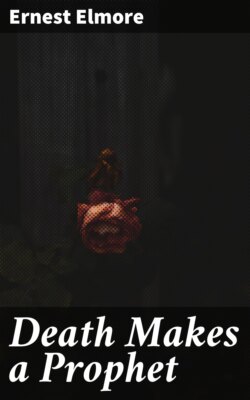Читать книгу Death Makes a Prophet - Ernest Elmore - Страница 19
На сайте Литреса книга снята с продажи.
VI
ОглавлениеTable of Contents
But later, in the silent seclusion of his bedroom, Eustace experienced a sudden pang of remorse. Was he being quite fair to Terence? Wasn’t he adopting a high-minded attitude which, in the circumstances, he had no right to adopt? Hypocrisy was an evil thing and he was perilously near to becoming a hypocrite himself. Or was he?
He paced about the room, restless and unhappy, trying to analyse the new mood which had descended upon him. That very evening, during the performance of his new ritual, he had found his mind wandering. The old powers of concentration seemed to have deserted him. Twice he had lost his place in the service. Twice he had turned to the left instead of the right, a lapse that had caused considerable confusion among his acolytes and symbol-bearers. His customary faultless touch had been lacking. Moreover, it was not only his mind that had wandered, but his eye. Time and again, ashamed of such laxity, he found himself casting swift and surreptitious glances at Penelope Parker. He seemed to draw inspiration from her as she stood by his side bearing the gilded Wings of Osiris on a red velvet cushion. But a personal rather than an ecclesiastic inspiration.
The previous evening, under the stress of an imperative emotion, he had written her a long delicately-worded letter expressive of admiration and gratitude. He had done his utmost to avoid any suggestion that he was writing to her as a man. It was the letter of a High Prophet to a beloved and loyal member of his priesthood. And yet, somehow, the warmer, more human phrases had crept in and Eustace had not found the courage to erase them. He even felt a kind of perverse thrill in his daring; and so anxious was he to post the letter before he grew faint-hearted that he had slipped out of “Tranquilla” and caught the midnight collection.
And that evening, after the service, Penelope had come up to him with the sweetest, humblest of smiles and murmured:
“I want to thank you for all the kind and lovely things you said to me in your beautiful letter. You make me feel so unworthy.”
Returning home with Mrs. Hagge-Smith he had walked on air, until the sight of Terence with that girl in his arms had brought him to earth with a bump.
But wasn’t Terence, perhaps, moved by emotions not unlike his own? Eustace frowned. No! No! The idea was ridiculous! What he felt for Miss Parker was a pure and spirituelle devotion devoid of all gross desires. Terence’s behaviour was inexcusable. His deception unforgivable. Whatever happened it was his duty to guard his son against the lures and temptations of the flesh. He must, with constant vigilance, keep his son’s purity unspotted. Such low desires must be sublimated. Terence must live on the Higher Plane as befitted the son of a man with a great mission.
Eustace ceased his prowling and gazed, fascinated, at his open escritoire. Several sheets of notepaper lay invitingly on the blotting-pad. His uncapped fountain-pen was ready to hand. But no! He must control his impulses. It would be quite wrong and very tactless to send Miss Parker a second letter so soon after the first. No! No! He must resist the lure to express the pleasure she had afforded him by her charming words. He must be strong, undress and get into bed. He ripped off his coat and waistcoat. He undid his tie and whipped off his tall starched collar. He unbuttoned his braces. And then, almost before he realised it, he was seated at his escritoire, pen in hand. He tried to struggle up. Something stronger than his own will pinned him to his chair. His pen was already travelling over the glossy notepaper.
My very dear Miss Parker, he wrote.
Then, with the temerity of an innocent man who finds he has sold himself to the devil, Mr. Mildmann cast all further restraint to the winds. He might as well be damned for a Casanova as a Dante, eh? He went the whole hog. He screwed up the sheet of notepaper and flung it into the waste-paper basket. Again he took up his pen.
My very dear Penelope, he wrote,
I cannot tell you how moved I was by your reception of my very inadequate expressions of admiration and gratitude...
It took twelve closely-written sheets to convey all he had to say. And when he had sneaked out and posted his letter, Mr. Mildmann was far from realising that he was formulating a habit that in the long run was to bring him infinite distress.
